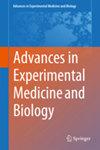Hepcidin and Tissue-Specific Iron Regulatory Networks.
4区 医学
Q2 Biochemistry, Genetics and Molecular Biology
引用次数: 0
Abstract
Hepcidin is primarily secreted by the liver and functions as an endocrine hormone. However, a growing number of studies show that hepcidin can also be produced locally by other cells and organs, where it acts in an autocrine/paracrine manner to mediate important iron-dependent pathways. These pathways can operate under normal homeostatic conditions or become relevant in pathophysiological conditions (inflammation, infection, cancer, liver disease, myocardial infarction, etc.). This chapter will delve into the local roles of hepcidin, highlighting its unconventional functions in barrier maintenance, host defense, growth, tissue housekeeping, and injury repair.
Hepcidin和组织特异性铁调控网络。
肝磷脂主要由肝脏分泌,起内分泌激素的作用。然而,越来越多的研究表明hepcidin也可以由其他细胞和器官局部产生,并以自分泌/旁分泌的方式介导重要的铁依赖性途径。这些途径可以在正常的体内平衡条件下运作,也可以在病理生理条件下(炎症、感染、癌症、肝病、心肌梗死等)发挥作用。本章将深入探讨hepcidin的局部作用,重点介绍其在屏障维护、宿主防御、生长、组织管理和损伤修复方面的非常规功能。
本文章由计算机程序翻译,如有差异,请以英文原文为准。
求助全文
约1分钟内获得全文
求助全文
来源期刊

Advances in experimental medicine and biology
医学-医学:研究与实验
CiteScore
5.90
自引率
0.00%
发文量
465
审稿时长
2-4 weeks
期刊介绍:
Advances in Experimental Medicine and Biology provides a platform for scientific contributions in the main disciplines of the biomedicine and the life sciences. This series publishes thematic volumes on contemporary research in the areas of microbiology, immunology, neurosciences, biochemistry, biomedical engineering, genetics, physiology, and cancer research. Covering emerging topics and techniques in basic and clinical science, it brings together clinicians and researchers from various fields.
 求助内容:
求助内容: 应助结果提醒方式:
应助结果提醒方式:


